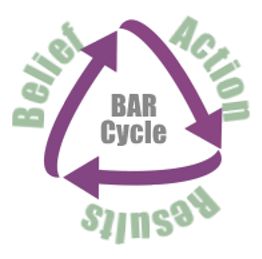Why do we do what we do? Human motivation has been the subject of countless studies and many more to come. Based on the recovery rate, with the billions of hours devoted to addiction, abuse, eating disorders, phobias and other compulsive behavior, human motivation is clearly not an exact science. This article may not be for you if you're looking for graduate level book learnin'. But, if you're looking for the lessons learned over decades by a man battling his own destructive compulsions, read on.
 My story includes chronic phobia, anger, self-loathing, addictions to alcohol,
sex, drugs, food and cigarettes. These compulsions had predictable impacts
on my careers and relationships, leaving me with only the family members who
tolerated me and my partners in the "low life." In my 30's, with the help
of God and Marsha (now my wife of 20 years), I began a long battle toward a life
free of compulsion. I can't say I've totally arrived, but most of my fears
and addictions are things of the past. What's left is an occasional bout
of overeating and occasional sexual temptations...I'm guessing, much like
everyone else. Here are some of
the most popular
books on controlling human compulsive
behavior. In my journey, I picked up a human motivation cycle from
someone, and don't remember the book or author. What I do remember is how
well the cycle applied to the cause and solution of every one of my compulsions.
Since I don't recall the exact terms, I've come to call it the BAR Cycle.; B.A.R. stands for Belief, Action and Results. The cycle
applies to all human motivation and behavior issues, including addictions and
compulsions. It's a tool for understanding why we do the things we do.
Belief generates action that creates results that strengthen or weaken the
belief.
My story includes chronic phobia, anger, self-loathing, addictions to alcohol,
sex, drugs, food and cigarettes. These compulsions had predictable impacts
on my careers and relationships, leaving me with only the family members who
tolerated me and my partners in the "low life." In my 30's, with the help
of God and Marsha (now my wife of 20 years), I began a long battle toward a life
free of compulsion. I can't say I've totally arrived, but most of my fears
and addictions are things of the past. What's left is an occasional bout
of overeating and occasional sexual temptations...I'm guessing, much like
everyone else. Here are some of
the most popular
books on controlling human compulsive
behavior. In my journey, I picked up a human motivation cycle from
someone, and don't remember the book or author. What I do remember is how
well the cycle applied to the cause and solution of every one of my compulsions.
Since I don't recall the exact terms, I've come to call it the BAR Cycle.; B.A.R. stands for Belief, Action and Results. The cycle
applies to all human motivation and behavior issues, including addictions and
compulsions. It's a tool for understanding why we do the things we do.
Belief generates action that creates results that strengthen or weaken the
belief.
Belief is what motivates all our actions. Beliefs about ourselves, our friends, our jobs, etc. If I told you your house was on fire and you didn't believe me, you would do noting. If you did believe me, you would take a different course of action. We can't continually act in a way that is inconsistent with our beliefs. This is why an anorexic is compelled to starve himself...he believes he's fat even when he isn't.
Action flows from belief. This is why we can't just change our actions and, say, not do it any more. Because an alcoholic believes he needs to drink to make up for a void he sees in himself, until that belief is changed, he won't be able to quit drinking on more than a temporary basis.
Conclusion at BAR Cycle And Compulsive Behavior-2
![]() Addiction Recovery
Addiction Recovery
Alcohol-i-days
Alcoholism And Food
Alcoholism Physical
Signs
Alcoholism Recovery Help
Alcoholism Signs Test
Alcoholism Withdrawal
Anorexia Nervosa
Signs
Anorexia
Recovery Help
BAR Cycle & Compulsion
Bulimia Tips-Recovery
Codependency Quiz
Compulsive Overeating
Compulsive Spending
Drug Addiction Quiz
Drug Addiction Recovery
Gambling Addiction
Help
Health And Fit.
Addiction
Parents Of Addicts
Plastic Surgery Addicts
Quit Smoking Support
Sex And Porn
Addictions
Sexual Addiction Help
Sexual Addiction
Signs
Tobacco Facts
When You Quit Smoking
Why Quit Smoking